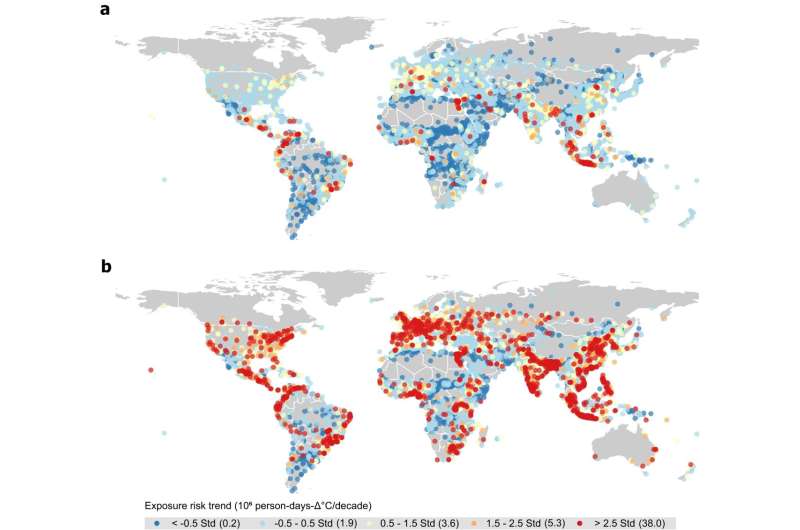This article has been reviewed according to Science X's editorial process and policies. Editors have highlighted the following attributes while ensuring the content's credibility:
fact-checked
trusted source
proofread
Researchers reveal rising compound risk inequality to aging and extreme heat wave exposure in global cities

Prof. Chen Mingxing's team at the Institute of Geographic Sciences and Natural Resources Research of the Chinese Academy of Sciences (CAS) has revealed the increasing inequality of the compound risk of aging and extreme heat wave exposure of global cities under future scenarios. This work was published in npj Urban Sustainability.
Extreme high temperature events have become more frequent in recent years due to climate change, increasing the risk of population exposure to extreme heat. Cities are particularly at a higher risk of heat stress, and the elderly are more vulnerable to exposure. The combined effects of climate change, rapid urbanization, the urban heat island effect, and aging further intensify the disparity in global urban heat exposure risk.
In this study, the researchers analyzed data from 27 Earth System Models simulated by the Coupled Model Intercomparison Project Phase 6, combined with scenarios from Shared Socioeconomic Pathways (SSPs) and Representative Concentration Pathways, and examined the spatiotemporal evolution of future exposure risk in 9,188 global urban settlements between 2020 and 2100 under the SSP2–4.5 and SSP5–8.5 scenarios.
The results showed that urban heat wave exposure risk increases by 619% and 1,740% for SSP2–4.5 and SSP5–8.5, respectively, and by 1,642% to 5,529% for the elderly.
The researchers further assessed the contribution of the effects of climate change, urbanization, and aging, with the aim of providing policymakers with targeted urban climate change adaptation strategies. They highlighted that cities around the world are facing an increasing risk of extreme heat wave exposure, with middle- and low-income countries particularly vulnerable due to their rapidly aging populations.
"The regional intensity of exposure risk growth for the elderly in megacities in middle- and low-income countries is higher than that in high-income countries. Significant inequalities in exposure risk growth trends exist between country income groups and city size groups, which poses a challenge to sustainable urban development, especially in terms of inequality and vulnerability in developing countries," said Prof. Chen.
"Therefore, there is an urgent need to strengthen the construction of low-carbon, green, and resilient urban models and policies to mitigate the risks of extreme heat waves, especially for vulnerable groups such as aging societies," he said.
More information: Mingxing Chen et al, Rising vulnerability of compound risk inequality to ageing and extreme heatwave exposure in global cities, npj Urban Sustainability (2023). DOI: 10.1038/s42949-023-00118-9
Provided by Chinese Academy of Sciences




















